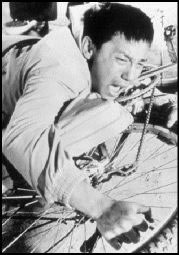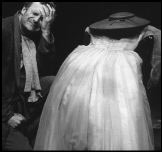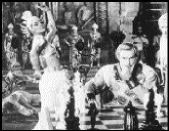BEIJING BICYCLE
directed by Wang Xiaoshuai with Cui Lin and Li Bin opens March 1 at Broadway Market
COASTING SO CLOSELY alongside De Sica’s 1948 neorealist classic The Bicycle Thief, Wang Xiaoshuai’s Beijing Bicycle might appear poised for a disastrous collision. Yet just as it is for the bumpkin Guei, who needs a bike to earn his living as a messenger in the harsh city, the bicycle means more to Wang than humble transportation; it’s a symbol of his changing country. The Beijing streets swarm with spinning spokes, with people balancing baskets of melons, mattresses, and even (with doubtful success) refrigerators on the thin alloy frames.
Wang’s emphasis on urbanization, not class, makes Bicycle more than a straight remake of De Sica. His dim but industrious hero, Guei (Cui Lin), is an outsider in sprawling Beijing, a yokel who gapes at an apparently idle beauty in a high-rise apartment and marvels at rumors of marble hotel bathrooms (“I wouldn’t be able to pee”). Then Guei’s prospects collapse when his bicycle is stolen, and he resolves to search for it.
His mountain bike ends up with Jian (Li Bin), a city kid about the same age, sullen and self-involved—in other words, a typical Western-style teenager. Jian uses the bike to practice stunts with his feral friends and to impress girls. When Guei tracks him down, Jian’s buddies, indifferent to Jian’s questionable ownership, beat the stubborn rube and force a compromise certain to explode.
Bicycle is a surprisingly reactionary film. Guei’s earnest need pitted against Jian’s frivolous desire isn’t much of a contest for our sympathies. Jian jettisons traditional Confucian values of family honor to acquire the thing he feels entitled to; he and his status-obsessed pals operate with no moral compass. Wang’s view of the future, as shown by the teens’ final struggle (city vs. country), is pretty dismal.
Yet what’s significant about even an average-quality picture like Bicycle is how Wang and young Chinese directors are addressing thornier contemporary subjects than were permitted a decade ago. Lavish historical epics are giving way to gritty urban tales equally worth seeing.
info@seattleweekly.comclass=”snug”
GENERATION GAP
MEETING WANG Xiaoshuai during his recent visit to Seattle, it’s hard to know which of Bicycle‘s antagonists I’m seeing—the naive provincial Guei or the city-hardened Jian. “I can be regarded as an outsider in Beijing,” he declares. “That’s the kind of situation I experienced, and I understand why these people [like Guei] wanted to go there. The whole country is changing. More like Western style; it’s not like traditional generations. I’m really trying to get used to that.”
Wang credits Chen Kaige’s 1984 Yellow Earth with opening him up to the painterly qualities of film shortly after he—then a 15-year-old —arrived from the provincial city of Wuhan to study in Beijing. He subsequently learned the hard way that under state control, “independent film wasn’t allowed.” After completing his first two films without permission or much money, he was blacklisted for three years. “I was so naive, I thought maybe the film board would be happy with what I did.” His next film, So Close to Paradise, took another three years to get through state censors.
At 36, Wang seems in generational limbo between old and new worlds. When I ask him if he really sees Chinese youth as so morally adrift and empty as in Bicycle, he tells me about the boys who worked on his crew. “You’re the director, you’re the cameraman—they don’t care. They didn’t get any payment; they say, ‘Oh, making a film is cool,’ and when you finish shooting—’Cut!’—they disappear. We’re not allowed to say, ‘Thank you.’ They just ride their bicycles back home. They’re like, you know, completely different from us.”
G.T.








